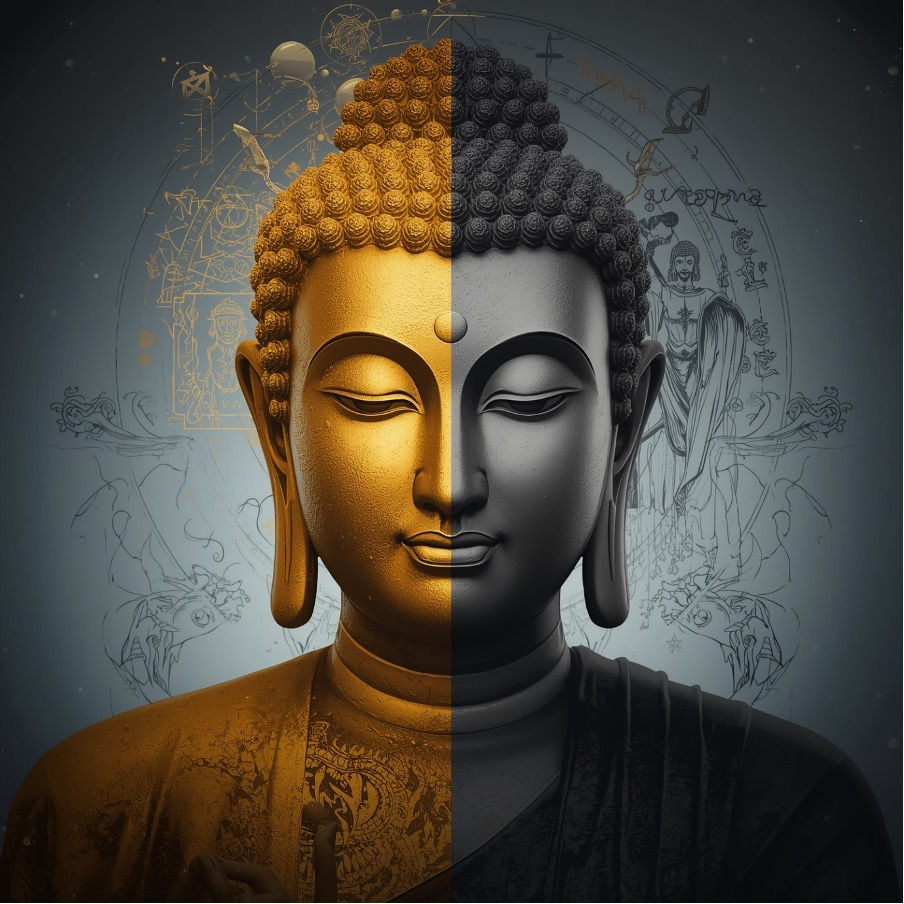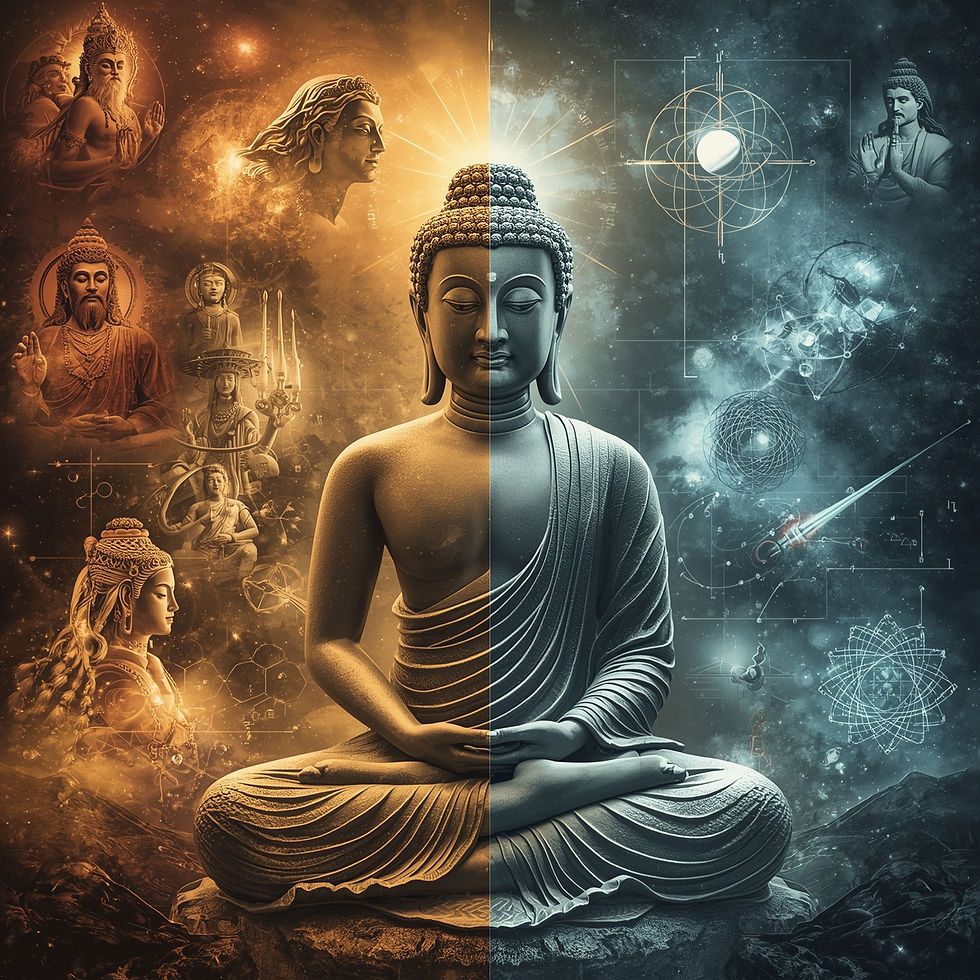Buddhism: The Religion That Skipped the God Debate
- Mrunal Madhuri Milind Dupte
- Aug 6, 2025
- 4 min read

“If the Buddha didn’t believe in God, does that make Buddhism atheistic?”
It's a question that stirs debate not only among casual observers, but even among seasoned Buddhist scholars. In many circles, especially within the modern Buddhist diaspora Buddhism and atheism are often used interchangeably. The logic seems simple: no creator god, no theism: so, Buddhism must be atheism. Right?
Not quite.
This assumption, while partly grounded in Buddhist teachings, misses the depth and diversity of Buddhist thought. Beyond lay interpretations, even within academic and philosophical circles, the relationship between Buddhism and atheism is anything but settled. Some scholars claim the Buddha’s silence on divine matters aligns Buddhism with atheism, while others believe such a view overlooks the spiritual and ethical foundations of the tradition.
This article dives deep into that very tension, examining what Buddhist texts, thinkers, and traditions really say about gods, belief, and the nature of reality. Is Buddhism truly atheistic? Or is it something far more subtle: non-theistic, anti-theistic, or perhaps beyond the theism-atheism binary altogether?
Read on and decide for yourself.
Understanding Atheism: A Simpler Idea Than It Seems
Atheism, at its core, is the absence of belief in gods. As Jack David Eller explains in Atheism and Secularity, the word comes from the Greek: a- (without) and theos (god). It’s not always a loud rejection of divinity sometimes it’s simply the absence of belief.
Theism, by contrast, is belief in one or more deities. Atheism opposes this, but even within atheism, there's variety:
Some are active disbelievers.
Others are indifferent or unconvinced.
There's also agnosticism a position that holds the existence of gods as unknown or unknowable. Some scholars draw firm lines between atheism and agnosticism; others see them as overlapping.
Interestingly, atheism has been misunderstood throughout history. Early Christians, for example, were labelled "atheists" by the Romans for rejecting traditional gods. Later thinkers like Baron d’Holbach argued that all humans are born atheists with no concept of God until taught otherwise. George H. Smith echoed this, suggesting that even unexposed or unaware individuals are technically atheists because they lack belief.
Atheism, then, isn’t always about denial. Sometimes, it’s about disinterest.
So, What Is Buddhism? A Religion Without a God?
Imagine living over 2,600 years ago, in a world where gods, spirits, and celestial beings were not just believed in they were a normal part of everyday life. That was the world Siddhartha Gautama, the Buddha, was born into. But rather than building his teachings on these popular beliefs, the Buddha did something radically different: he turned inward.
Though he acknowledged the existence of gods (devas) as was common in Indian cosmology he didn’t give them special status. In Buddhism, gods are not all-powerful creators or eternal saviours. They are simply beings much like humans trapped in the endless cycle of birth, death, and rebirth (samsara), subject to suffering and ignorance. They may live longer, but they’re still not enlightened, and most importantly, they can’t help you attain liberation or free you from suffering.
“Māra, the Evil One, imagined: ‘Now this recluse will fall into my power.’ But the Blessed One knew Māra's thoughts and said: ‘I know you, Māra! Do not think you can overpower me.” Samyutta Nikāya (SN 4.1)

So, what did the Buddha focus on instead of divine beings? The answer is striking in its simplicity: suffering, its causes, and how to end it. His teachings are non-theistic not because he denied the existence of gods, but because they’re irrelevant to the spiritual path. Enlightenment, he taught, comes not through prayer or divine intervention, but through your own effort, insight, and ethical living.
This approach is clear in the Pāli Canon, where the Buddha neither confirms nor denies the existence of a creator god. He simply puts the question aside, suggesting it distracts from what really matters: ending suffering.
“Whether the world is eternal or not… whether the soul and the body are the same or different these things are not declared by the Tathāgata.” Cula-Malunkyovāda Sutta (MN 63)
This silence was deliberate. As Dr. Alexander Berzin notes, the Buddha refused to answer fourteen major metaphysical questions including those about the soul, the cosmos, and God because speculation doesn’t lead to awakening.
The Dalai Lama echoes this understanding:
“Buddha and the Jain founder, Mahavira, emerged in an era that emphasized supernatural belief. Yet neither of them spoke of God. Instead, they focused on cause and effect. Thus, Jainism, Buddhism, and certain schools of Samkhya are non-theistic traditions.”
A Tradition Rooted in Human Experience
But Buddhism isn’t just non-theistic it’s deeply human-centered. The Buddha repeatedly urged people not to rely blindly on scriptures, teachers, or traditions. He insisted on direct experience and ethical reasoning.
“Do not go upon what has been acquired by repeated hearing… nor upon the authority of your teachers or elders. When you know for yourselves… that these things are unwholesome, then abandon them.” Kālāma Sutta (AN 3.65)
At the heart of it all is self-responsibility:
“By oneself is evil done; by oneself is one defiled. By oneself is evil left undone; by oneself is one purified. No one can purify another.” Dhammapada 165
This is not just a rejection of divine salvation it’s a call to personal empowerment. You are your own path. Your liberation is in your hands.
So, Is Buddhism Atheist?

Not exactly.
While it rejects a creator god. More than atheistic, Buddhism is non-theistic: it focuses on what works rather than what is believed. It also embraces metaphysical ideas like karma, rebirth, and nirvana concepts that many modern atheists might find hard to digest.
Yet it approaches them not as articles of faith, but as parts of a moral and existential framework.
In that sense, Buddhism escapes the binary of theism and atheism. It doesn't ask, "Do you believe in God?" but instead, "Are you free from suffering?"
Conclusion
Buddhism challenges conventional labels. While it doesn’t promote belief in a creator god, it also doesn’t outright deny the existence of divine beings it simply sees them as irrelevant to the path of liberation. Rooted in personal inquiry, ethical action, and self-realization, Buddhism is not so much atheist as it is non-theistic and pragmatic. In the end, whether one calls it atheism or not may matter less than the Buddha’s central message: liberation lies within.



